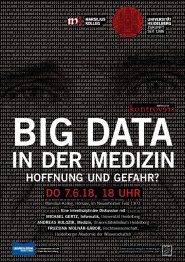MARSILIUS KONTROVERS
Big Data in Medicine. Hope and Danger?
Here you can find the recording of the panel discussion.
Interdisciplinary Discussion with Michael Gertz (Computer Science), Andreas Kulozik (Medicine) and Fruzsina Molnár-Gabor (Law)
Abstract
In the fourth event of the series “Marsilius kontrovers” risks and rewards of different forms of “Big Data” in medicine will be critically discussed from a computer scientific, medical, and juridical perspective.
Medicine is on its way from an “empirical science” to a data-driven discipline. The evaluation of complex biological data sets is gaining importance and provides a scientific data base for the best treatment. As a result, therapies are getting more effective and less debilitating. Oncology is a widely discussed example for this. In a different manner, digitalisation has us in its grasp in our daily life! Social media, messenger services, Alexa & co. are continually collecting data, with which we are eagerly feeding these services. Algorithms and processes of artificial intelligence are applied to the so collected “Big Data” in order to make our life easier and improve our health. But do fitness-apps, wearables and lifelogging devices that continuously record our vital signs and give us instructions really lead us to a healthier life? Is the value of these records for a better medicine documented?
To what extent can the health system be organised more efficiently through the use of different kinds of “Big Data”, and costs and insurance premiums be lowered? Or is the so important contact to the physician threatened to be lost by these mass recordings of data? Do we want physicians to soon be only an interface between algorithms and patients? Will our individual concepts of life be testable through access to our medical condition, or even controllable? Are we really promoting the desirable development of personalised medicine this way?
The collection and analysis of sensitive data poses a plethora of juridical questions. Which meaning do data security, anonymization and privacy retain? Who is liable if algorithms make wrong decisions and physicians rely on them? Which implications does data transfer have in the context of global research and medical services?
Thursday, June 7, 2018, 18 h
Marsilius-Kolleg, Lecture Hall
Im Neuenheimer Feld 130.1, 69120 Heidelberg
|
|
In cooperation with
Rhein-Neckar-Zeitung |





